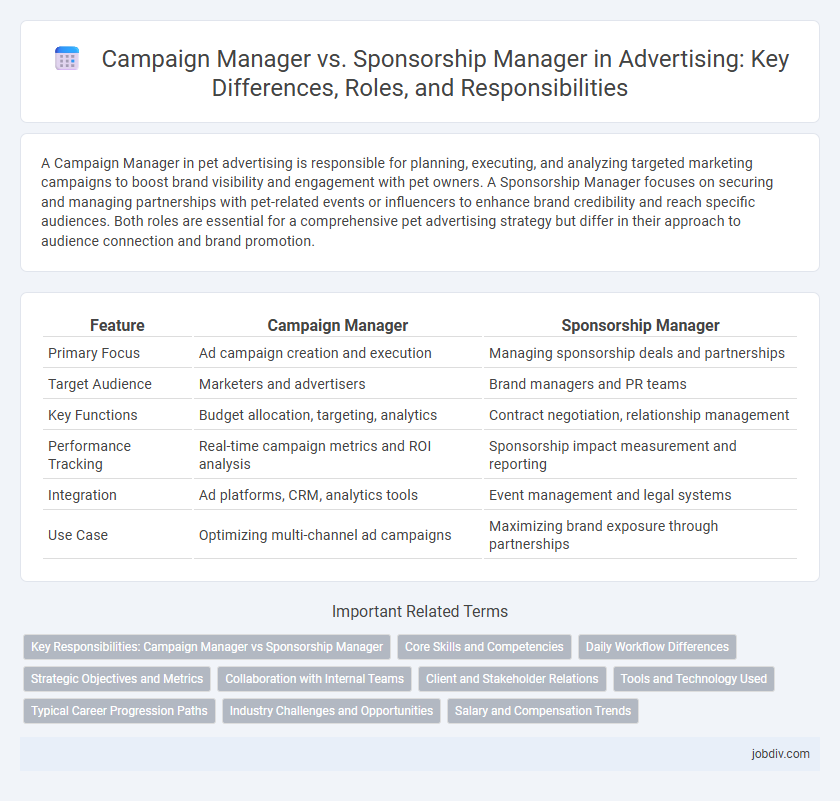A Campaign Manager in pet advertising is responsible for planning, executing, and analyzing targeted marketing campaigns to boost brand visibility and engagement with pet owners. A Sponsorship Manager focuses on securing and managing partnerships with pet-related events or influencers to enhance brand credibility and reach specific audiences. Both roles are essential for a comprehensive pet advertising strategy but differ in their approach to audience connection and brand promotion.
Table of Comparison
| Feature | Campaign Manager | Sponsorship Manager |
|---|---|---|
| Primary Focus | Ad campaign creation and execution | Managing sponsorship deals and partnerships |
| Target Audience | Marketers and advertisers | Brand managers and PR teams |
| Key Functions | Budget allocation, targeting, analytics | Contract negotiation, relationship management |
| Performance Tracking | Real-time campaign metrics and ROI analysis | Sponsorship impact measurement and reporting |
| Integration | Ad platforms, CRM, analytics tools | Event management and legal systems |
| Use Case | Optimizing multi-channel ad campaigns | Maximizing brand exposure through partnerships |
Key Responsibilities: Campaign Manager vs Sponsorship Manager
Campaign Managers oversee the strategic planning, execution, and optimization of multi-channel advertising campaigns, focusing on target audience segmentation, budget allocation, and performance metrics analysis. Sponsorship Managers concentrate on building and maintaining relationships with sponsors, negotiating contracts, and activating sponsorship assets to enhance brand visibility and engagement at events or through media partnerships. Both roles require strong communication skills, but Campaign Managers prioritize data-driven decision-making while Sponsorship Managers emphasize partnership development and brand alignment.
Core Skills and Competencies
Campaign Managers excel in data analysis, audience segmentation, and digital media planning to optimize advertising performance and ROI. Sponsorship Managers possess strong relationship-building skills, negotiation expertise, and brand alignment strategies to secure and manage partnerships that enhance brand visibility. Both roles require project management and communication skills, but Campaign Managers focus more on metric-driven strategies while Sponsorship Managers emphasize strategic collaborations and brand synergy.
Daily Workflow Differences
Campaign Managers oversee the creation, execution, and optimization of advertising campaigns, involving tasks such as media planning, ad performance analysis, and budget adjustments on a daily basis. Sponsorship Managers concentrate on managing partnerships, negotiating contracts, coordinating branded content, and ensuring sponsor deliverables align with marketing objectives. The daily workflow of Campaign Managers is data-driven and focused on tactical campaign elements, whereas Sponsorship Managers prioritize relationship management and strategic alignment with brand partners.
Strategic Objectives and Metrics
Campaign Managers drive brand awareness and conversion metrics through targeted advertising strategies, focusing on click-through rates, impressions, and return on ad spend (ROAS). Sponsorship Managers emphasize long-term brand equity and partnership value, measuring success via audience engagement, brand lift, and sponsorship activation impact. Both roles align with strategic objectives but differ in tactical execution and performance indicators.
Collaboration with Internal Teams
Campaign Managers work closely with creative, analytics, and media buying teams to design, execute, and optimize advertising campaigns, ensuring alignment with overall marketing goals. Sponsorship Managers collaborate with sales, legal, and branding departments to secure and manage partnership deals that enhance brand visibility and credibility. Both roles require seamless communication and coordination with internal stakeholders to maximize campaign effectiveness and return on investment.
Client and Stakeholder Relations
Campaign Managers oversee the planning and execution of advertising campaigns, ensuring alignment with client objectives and maintaining clear communication to optimize performance metrics. Sponsorship Managers focus on cultivating and managing partnerships with stakeholders to enhance brand visibility and secure long-term collaborations that drive mutual value. Both roles require strong relationship management skills, but Campaign Managers prioritize direct client engagement, while Sponsorship Managers emphasize stakeholder alliance and strategic sponsorship activation.
Tools and Technology Used
Campaign Managers leverage advanced digital marketing platforms such as Google Ads, Facebook Business Manager, and data analytics tools like Tableau to optimize ad targeting and measure ROI effectively. Sponsorship Managers use relationship management software like CRM systems and event activation platforms, including SponsorCity, to coordinate partnerships and track sponsorship deliverables. Both roles increasingly incorporate AI-driven insights and automation tools to enhance campaign efficiency and stakeholder engagement.
Typical Career Progression Paths
Campaign Managers often begin as marketing coordinators or assistants, advancing to senior campaign roles by mastering digital advertising and analytics, ultimately progressing to director-level positions with responsibility for multi-channel strategies. Sponsorship Managers typically start in event coordination or partnership roles, evolving through experience in negotiation and relationship management to senior sponsorship or brand partnership leadership. Both career paths demand strong project management skills but diverge in specialization: Campaign Managers focus on targeted advertising execution and metrics, while Sponsorship Managers emphasize collaboration with external partners to enhance brand visibility.
Industry Challenges and Opportunities
Campaign Managers face industry challenges such as rapidly changing digital platforms and data privacy regulations that demand agile strategy adaptation and precise audience targeting. Sponsorship Managers navigate opportunities in brand alignment and experiential marketing, leveraging partnerships to enhance consumer engagement and build long-term brand equity. Both roles require deep market insights and collaborative skills to optimize ROI and drive impactful advertising outcomes.
Salary and Compensation Trends
Campaign Managers typically earn a median salary ranging from $70,000 to $110,000 annually, with compensation increasing significantly in digital advertising sectors and major markets. Sponsorship Managers command salaries often between $65,000 and $105,000, with additional performance-based bonuses tied to securing high-value partnerships and event sponsorships. Trend analysis reveals Campaign Managers benefit from rapidly growing demand and higher base pay, while Sponsorship Managers gain substantial incentives through commission structures linked to campaign success and brand alignment.
Campaign Manager vs Sponsorship Manager Infographic

 jobdiv.com
jobdiv.com